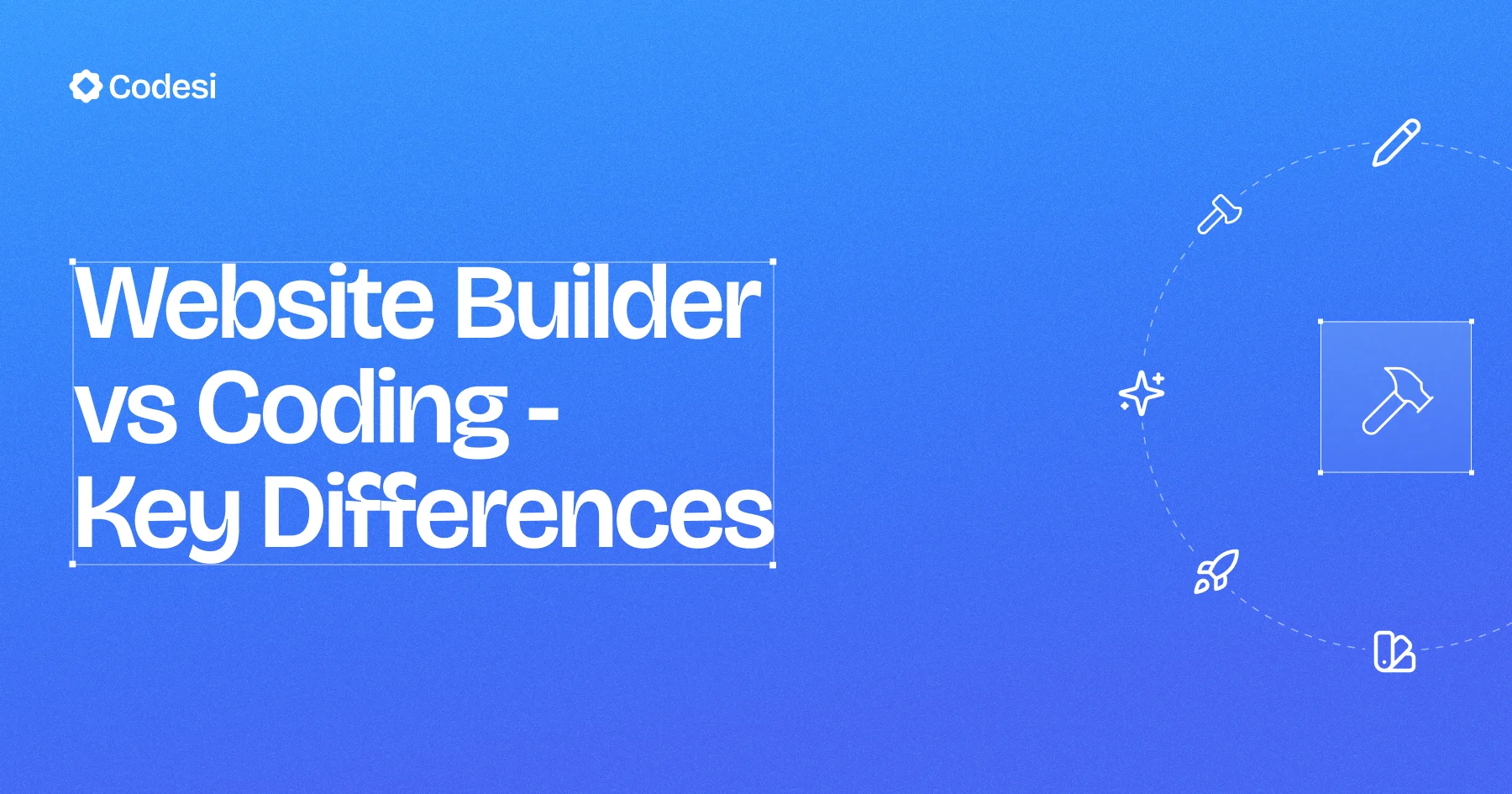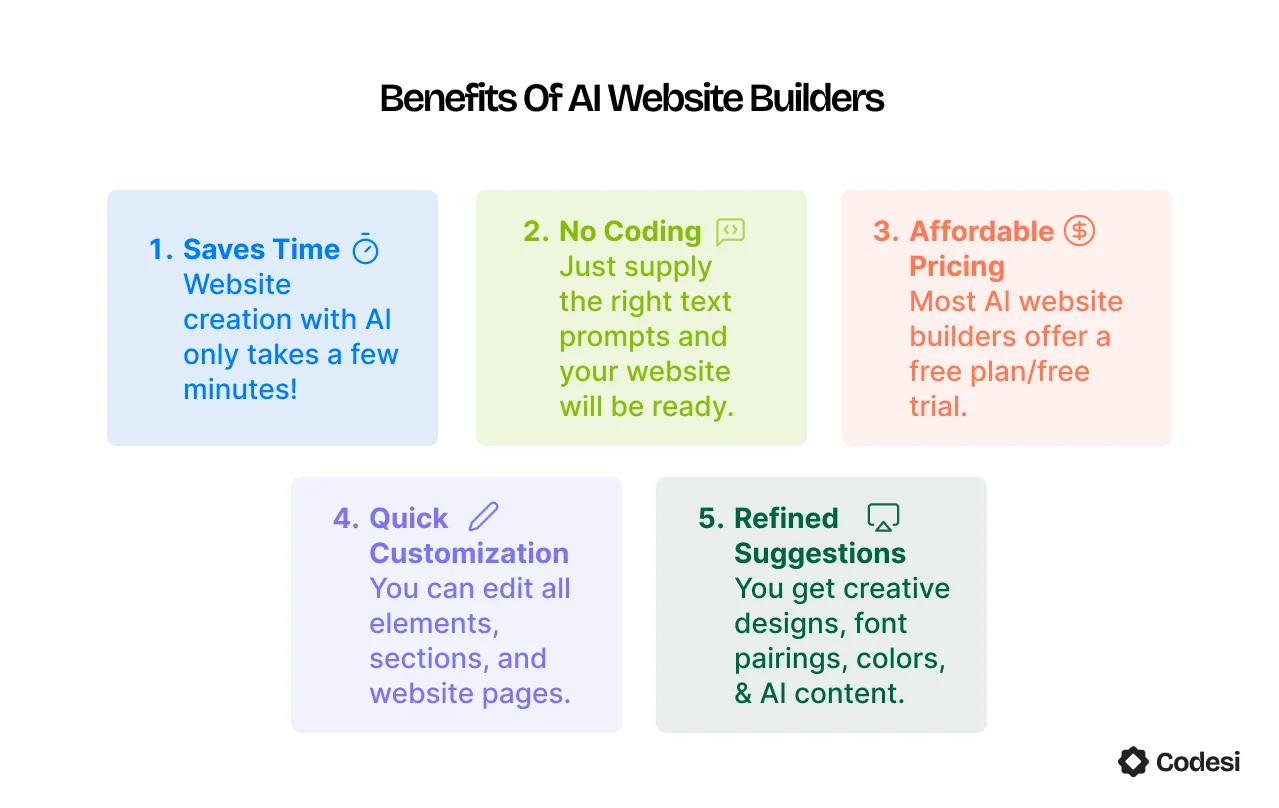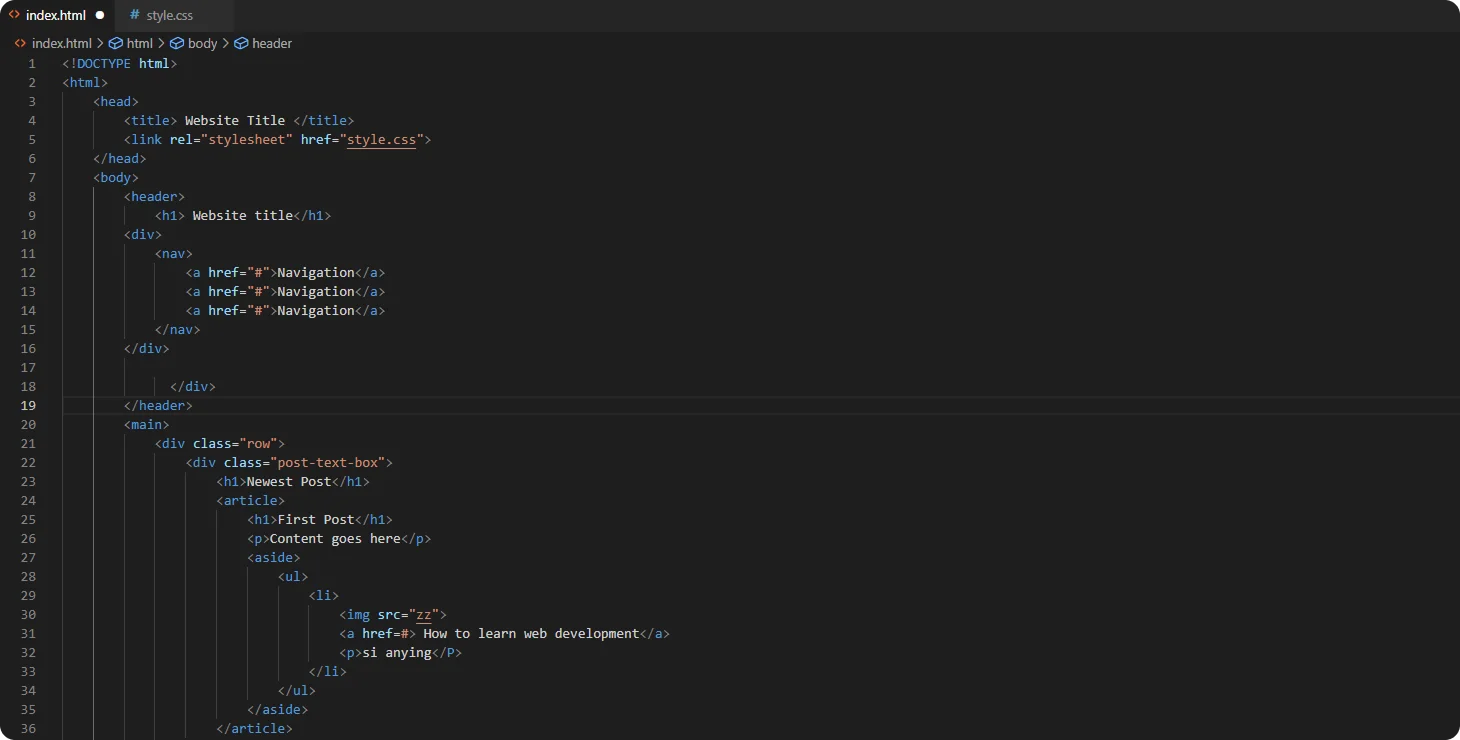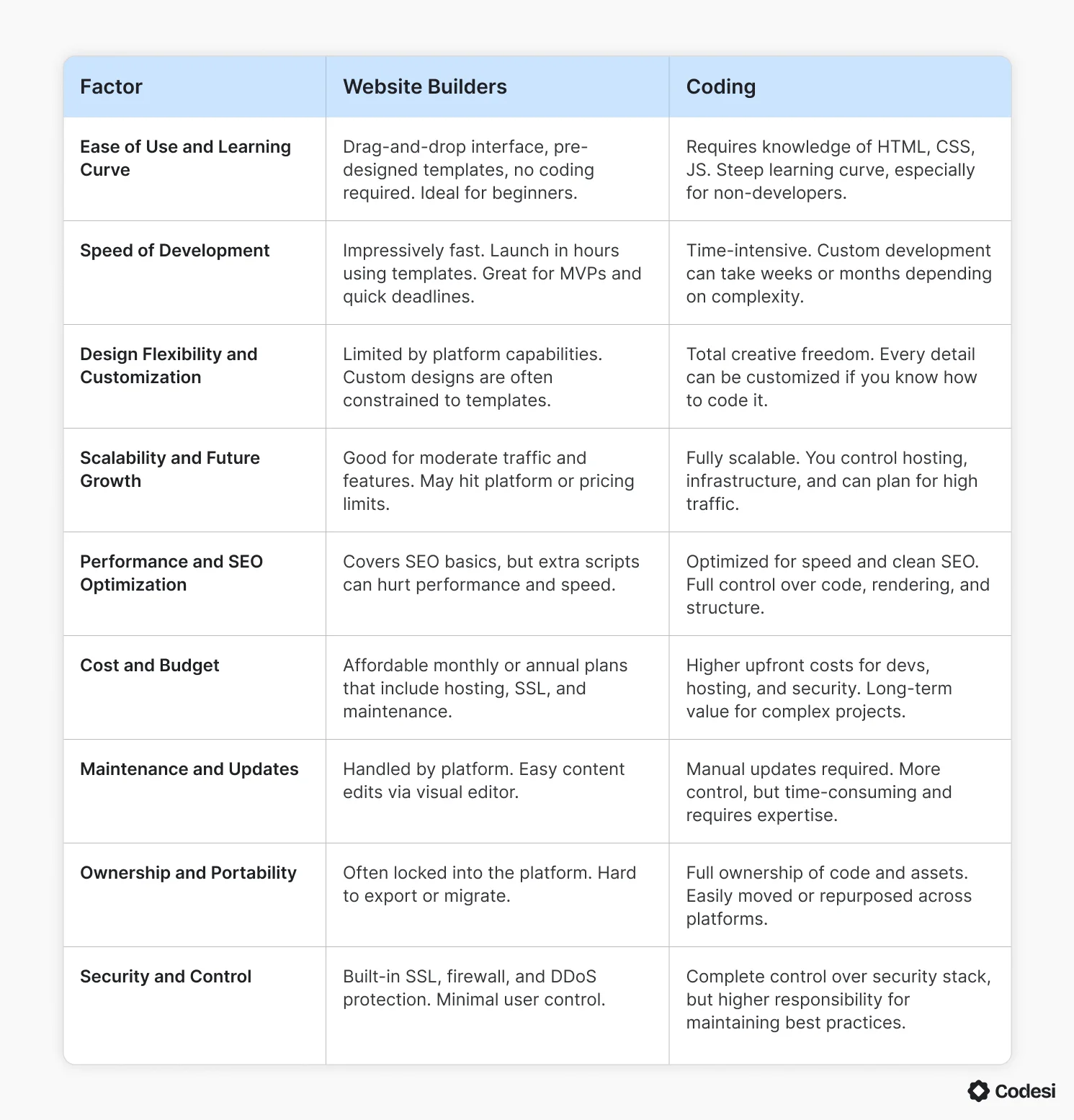Back to blog
Website Builder vs Coding: 9 Things to Consider in 2026
Explore website builder vs coding and discover which option fits your skills, timeline, and goals for launching a site that truly works for you.

Jun 26 2025

Choosing between a website builder and coding from scratch can feel like picking sides in a long-running debate.
Builders make things easy – just drag, drop, and launch. Coding takes more time and skill but gives you complete control over every part of your site.
In this website builder vs coding guide, we'll look at the fundamental differences that matter: speed, customization, SEO, performance, and more.
You'll get a clear view of what each option offers, where each one falls short, and which approach makes the most sense based on your project and goals.
What Is a Website Builder, and What Is Coding?
Before comparing the two approaches in depth, it's important to clarify what each actually involves.
A website builder is a platform designed to simplify web creation through visual tools.
Users can choose from pre-designed templates, rearrange elements with a drag-and-drop interface, and publish a site without writing code. These tools prioritize speed, accessibility, and ease of use – making them ideal for users with little to no technical background.

Note:
In 2025, analysts value the global website builder market at approximately $2.2 billion and project it to reach nearly $3.7 billion by 2033.
Coding refers to manually building a website using programming languages such as HTML, CSS, and JavaScript, as well as backend technologies like PHP or Python.

This method gives you detailed oversight of design, functionality, and performance. However, it requires technical expertise and significantly more development time.
Website Builder vs Coding: 9 Key Differences That Really Matter
To help you get a clear picture, here's a side-by-side comparison table of website builder vs coding across the nine factors that matter most – followed by a deeper dive into each one:

1. Ease of Use and Learning Curve
Website builders prioritize simplicity. Their visual editors allow you to drag, drop, and rearrange elements – no coding experience is needed. Most offer pre-designed templates, guided setups, and intuitive styling controls, making it easy for anyone to create a functional and visually appealing site within hours or even minutes with web builders like Codesi.
Manual coding, on the other hand, requires a solid knowledge of HTML, CSS, and JavaScript at a minimum. You'll also need to understand responsive design, browser behavior, and debugging tools.
Even creating a basic landing page involves manually writing code, linking files, and testing your work across devices and browsers. For non-developers, this steep learning curve can be a barrier.
Key Takeaway:
Website builders offer a low-friction, beginner-friendly entry point. Coding takes time to learn but rewards you with greater control.
2. Speed of Development
Website Builders shine when speed is essential. Thanks to ready-made templates and pre-built sections, users can publish a site in a single afternoon.
This speed is especially beneficial for landing pages, event sites, portfolios, or minimum viable products (MVPs) that teams need to deploy quickly.
For example, an entrepreneur can select a template, add content, and publish within hours, without touching code or worrying about hosting.
Hand-coding takes significantly longer. Developers must manually build each feature and section.
Even basic functionality, such as a contact form or mobile responsiveness, requires careful implementation and thorough testing to ensure optimal performance. The timeline for custom sites often spans weeks or even months, depending on the complexity and number of features.
Key Takeaway:
Builders help you go live fast – ideal for time-sensitive launches. Coding takes more time, but it allows you to create a custom product built precisely to your specifications.
3. Design Flexibility and Customization
Website Builders provide a variety of pre-built design options – grids, sliders, buttons, and style presets, but they're often limited to a fixed layout system.
You can change colors, fonts, and content placement, but anything beyond the builder's default capabilities may be complicated.
However, some builders now include AI-powered image generation to create custom visuals.
Coding gives you the flexibility to build features and layouts beyond template constraints. From micro-interactions to unconventional layouts, every pixel is yours to define.
Need a parallax scrolling effect, a hand-drawn navigation bar, or a unique user interaction? With coding, if you can imagine it and have skills, you can build it.
Key Takeaway:
Builders are great for standard designs and fast branding. Coding gives you the creative freedom to build something original.
4. Scalability and Future Growth
Website Builders can handle moderate traffic and growing feature sets, but there are limits. Most operate on shared hosting plans and offer tiered pricing for increased traffic or functionality.
As your audience grows or your site becomes more complex, you may hit plan ceilings that require upgrading or switching platforms entirely.
Hand-Coded sites can scale by design. You control the tech stack, hosting, and architecture, which allows you to prepare for future growth. You can optimize the backend, split the site into microservices, or integrate APIs as needed.
If you're building a product that could attract thousands (or millions) of users, custom code gives you the freedom to evolve your site's performance and infrastructure without hitting platform limits.
Key Takeaway:
Builders are fine for modest growth. Custom-coded sites scale more easily and adapt better to evolving needs.
5. Performance and SEO Optimization
Website Builders often include SEO-friendly features, such as meta tag editors, sitemap generation, and image alt text fields. These are great for covering the basics, especially for non-technical users. However, builders sometimes add extra scripts and styles that slow page loads, hurting user experience and Google rankings.
Hand coding allows for deep performance optimization. Developers can strip down code, minimize file sizes, and leverage lazy loading, asset compression, and server-side rendering.
You can also follow SEO best practices with a clean HTML structure, proper tag hierarchy, and fully customized metadata.
Key Takeaway:
Builders cover SEO basics and make optimization easy. Hand-coded sites perform better when speed and search ranking are top priorities.
6. Cost and Budget
Website Builders offer cost-effective, all-in-one packages. Most charge a monthly or annual fee that includes hosting, SSL certificates, templates, and maintenance.
For early-stage startups or side projects, this predictable pricing model is often ideal. You avoid the high upfront cost of hiring a developer or designer.
Hand-coded sites generally require a bigger budget. Hiring a professional developer, designer, or agency can cost anywhere from hundreds to tens of thousands of dollars.
Plus, you'll need to pay separately for hosting, security, backups, and possibly additional tools or integrations. You should also consider the value of your time and effort, even if you do it yourself.
Key Takeaway:
Builders are budget-friendly with fixed costs and bundled features. Coding costs more upfront, but it may pay off for long-term projects that require full customization.
7. Maintenance and Updates
Website Builders handle technical upkeep automatically. Platform providers handle software updates, security patches, and server management.
You can update site content using the visual editor, and changes go live instantly – no need to upload files or write scripts.
Hand-coded sites require ongoing manual maintenance. Any updates to the design, features, or code must be implemented by you (or your developer).
This includes fixing bugs, updating libraries, and staying current with security standards. The more custom your site is, the more effort it takes to maintain.
Key Takeaway:
Builders reduce the burden of maintenance. When you code your own site, you control the updates, but each change requires developer effort.
8. Ownership and Portability
Website builders often lock you into their ecosystem. Many use proprietary systems, which can make it difficult to export or migrate your site to another location.
If the platform shuts down or you outgrow its features, you might have to rebuild your site from scratch on another system.
Hand-coded sites give you complete ownership of your files, code, and assets. You can host the site anywhere, move it to a new server, or adapt it into a different format.
This level of freedom is especially valuable for long-term projects or organizations that don't want to depend on a single vendor.
Key Takeaway:
Custom code gives you absolute flexibility and easy portability. Builders are convenient but may create lock-in risks.
9. Security and Control
Website Builders provide out-of-the-box security features like SSL, firewalls, and DDoS protection. These are ideal for users without technical knowledge.
However, since builders often serve thousands of customers using the same infrastructure, a single vulnerability can affect multiple sites simultaneously.
Hand-Coded sites allow you to implement custom security practices. You can control authentication methods, sanitize inputs, and use secure frameworks.
While this gives you greater protection against targeted threats, it also requires vigilance – you're responsible for keeping everything secure and up to date.
Key Takeaway:
Builders offer essential security without much effort. Coding gives you advanced control but demands more responsibility.
Website Builder or Coding? Which Is Right for You?
Ultimately, the best choice depends on your needs and resources.
Here's a quick guide:
Website Builders work best for:
- Non-technical founders or teams that need a site fast, without coding skills, yet still want a professional look.
- Small businesses or side projects with tight budgets, since builders bundle hosting, domains, and SEO tools into affordable plans.
- Simple sites like portfolios, blogs, small online stores, or marketing pages that fit well within templates and demand speed.
- Teams where marketers or non-developers will update content regularly via visual editors.
Coding suits:
- Complex, custom projects requiring unique features, advanced UI, or integrations outside the scope of builders.
- Growing businesses that expect heavy traffic or require enterprise-level scalability need tailored architecture.
- Developers or teams want direct control over every detail and are willing to invest time and money.
- Learning projects or long-term builds where mastering web development and future-proofing are priorities.
Why Codesi Delivers the Best of Both Worlds
The choice between website builders and coding depends on what matters most to your project – speed, customization, or technical precision.
Builders help you launch quickly with fewer barriers. Coding opens the door to deeper customization, but it often requires more time and expertise.
Codesi gives you the speed of a builder with the flexibility to grow.
What sets it apart is how fast you can go from concept to launch.
Start by using its AI-powered business name generator to get short, brandable names with available domains. Then bring that name to life with:
- An AI landing page builder that generates a professional one-page site based on your input
- A logo generator that produces clean, on-brand visuals
- An AI image tool for custom graphics tailored to your design direction
- Clean, exportable HTML/CSS/JS when you need to expand or fine-tune
All features are integrated by design, eliminating the need for external designers, developers, or multiple standalone tools.
Are you looking to launch quickly without compromising on quality?
Try Codesi for free and build your brand name, logo, website, and visuals – all in one platform in just minutes.
Create your website with AI today
Codesi is a platform where you can make a website in 3 minutes.
No coding, no designers, no hassle - just AI.
